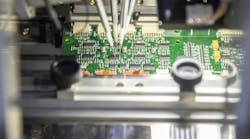President Biden held a summit April 12 with advisors and executives from semiconductor and auto manufacturing companies in order to discuss short- and long-term government responses to the current shortage of semiconductor computer chips.
In the meeting, Biden and several advisors met with executives from semiconductor companies with U.S. operations, including GlobalFoundries CEO Tom Caulfield, Intel CEO Pat Gelsinger, Sanjay Mehrotra of Micron Technology, and other senior executives from TSMC, Samsung, and others.
Affected manufacturing companies were also represented. Auto executives Mary Barra of GM, Jim Farley of Ford, and Carlos Tavares of Stellantis also participated in the virtual meeting, as did leaders from telecommunications companies like AT&T and Google’s parent company Alphabet.
In a press briefing held before the meeting, Press Secretary Psaki said the meeting was part of the Biden administration’s near term move to engage with industry, “as well as our international partners to ensure that American companies are operating on an even playing field.”
She also pointed out that the Biden administration has already endorsed the investments in the CHIPS for America Act, which calls for $50 billion in investments in semiconductor manufacturing and research.
Asked if the administration sees the semiconductor shortage as an issue of national security, Psaki said, “We certainly do.”
In remarks given after the meeting, Biden noted that the investments in the CHIPS for America Act already have significant bipartisan support, citing a letter he received from 23 senators of both parties supporting the bill and warning of China’s own increased investment in the field.
“We’re investing aggressively in areas like semiconductors and batteries,” said Biden. “We’re seeking a significant investment in this piece of legislation.”
The CHIPS bill, Biden said, is “important, but we know it’s not sufficient,” and said his American Jobs Plan infrastructure package would also increase government investment in what Biden referred to as “the infrastructure of today,” which he said includes semiconductors as well as batteries and broadband internet. Holding up a computer chip, Biden said, “This is infrastructure.”
The Semiconductor Industry Association, of which Caulfield, Gelsinger, and Mehrotra are board members, hailed the meeting and reiterated its endorsement of the CHIPS for America act.
“Funding the chip manufacturing incentives and research investments called for in the CHIPS for America Act, as President Biden’s infrastructure plan would do, will strengthen U.S. semiconductor production and innovation across the board so all sectors of our economy have the chips they need,” a statement from the SIA said.
This article originally appeared on Industry Week.



